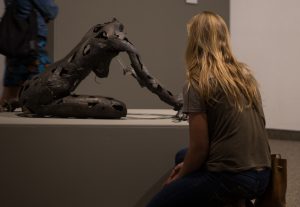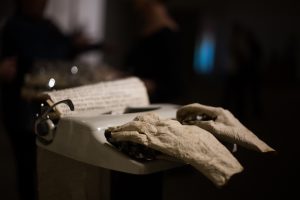Permanent and Special Exhibits
Berlin Wall Accordion Closed
Permanent Exhibit at Northern Arizona University
In 2013, The Martin-Springer Institute had a leading role in creating an exhibit on the Berlin Wall that contextualized the 1961 building and 1989 dismantling of the wall that separated the two Germanies. A big piece of the original Berlin Wall had been donated to NAU by the Baker family in 1993. In a collaborative effort between the Institute and students and faculty from the departments of Comparative Cultural Studies, History, and Interior Design, the exhibit was dedicated in 2014 with a permanent home on the second floor of NAU’s University Union.
The fragment of the wall, still covered in graffiti and rebar, has been augmented with a display of prize-winning photographs donated by the German Consulate in Los Angeles, East German coins and paper money, and books from that period of time. The large wall fragment is surrounded with see-through fencing and silhouettes of people, symbolizing the separation of the city for 28 years.
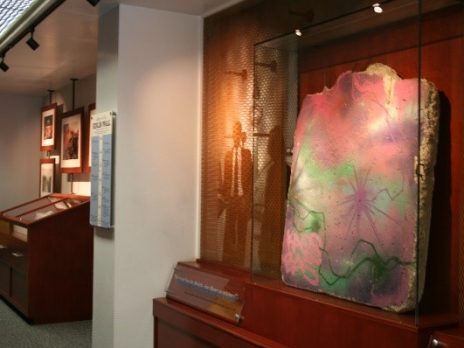
Echoes of Loss Accordion Closed
2018 Art Exhibit (Coconino Center for the Arts)
Echoes of Loss: Artistic Responses to Trauma brought together diverse works by contemporary artists exploring how ordinary experiences, 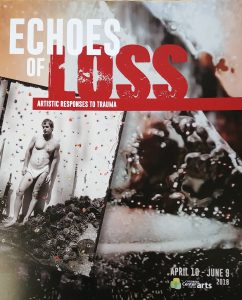 cultural histories, and natural environments are infused with loss and trauma. The invitational show with artists from various national and ethnic backgrounds (Native American, Black American, Jewish American, Iranian, German, Israeli, Slovakian) framed trauma and loss through their echoes, suggesting that art can make the visceral experiences of pain resonate through the textures of a brushstroke, the materiality of a sculpture, or the overlapping images in a filmic collage. The selected works of art depicted loss as a form of physical, psychological, and emotional suffering while mindful of approaching collective and individual traumas with deep compassion.
cultural histories, and natural environments are infused with loss and trauma. The invitational show with artists from various national and ethnic backgrounds (Native American, Black American, Jewish American, Iranian, German, Israeli, Slovakian) framed trauma and loss through their echoes, suggesting that art can make the visceral experiences of pain resonate through the textures of a brushstroke, the materiality of a sculpture, or the overlapping images in a filmic collage. The selected works of art depicted loss as a form of physical, psychological, and emotional suffering while mindful of approaching collective and individual traumas with deep compassion.
Introduction to the exhibit:
Walk-through:
Wounded Landscapes Accordion Closed
2014 Art Exhibit (NAU Art Museum)
Wounded Landscapes: Post-Holocaust Drawings, Artist Books, Paintings brought into conversation the work of two artists, Arie Galles and Karen Baldner. As descendants of Holocaust survivors, each artist wrestled with their creating art in a post-Shoah world. Independent of each other, they have created a body of work that addresses the impact of the Holocaust through personal perspectives. Juxtaposing drawings, prints, and artist books in Wounded Landscape heightened the creative tension contained in their work.
Arie Galles was born in 1944 in Tashkent, Uzbekistan (former USSR) and lived in Poland and Israel before coming to the United States. He was the director of the Creative Arts Program at Soka University of America in Aliso Viejo, CA, where he now is Professor of Art. Karen Baldner grew up in West Germany in a Jewish family and now teaches Book Arts and Drawing at Herron School of Art & Design at Indiana University, Indianapolis.
The exhibition (March 11 through April 26, 2014) was a joint project by Martin-Springer Institute and the NAU Art Museum.
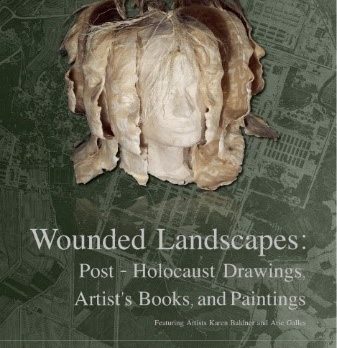
Listen to co-curator Bjorn Krondorfer
Culpable Accordion Closed
2015 Commissioned Art Installation
Culpable was a commissioned art installation by local artist Shawn Skabelund about the humanitarian crisis at the Arizona-Mexico border. It was shown at NAU’s Riles building in the spring of 2015.

In an artistic statement, Shawn wrote: “I designed Culpable after I visited Operation Streamline at the Tucson Federal Courthouse in 2012 and 2013. As I witnessed this process where migrants are sent to prison for between 30-180 days, I had an overwhelming feeling of deep sadness and guilt, not so much for the migrants but for the process… This nation was built on migration, and its destiny continues to be manifested by a natural human desire and need for familial economic sustainability. Why does our country allow commerce to cross borders while refusing individuals that same right?… I am as culpable as they are.”
